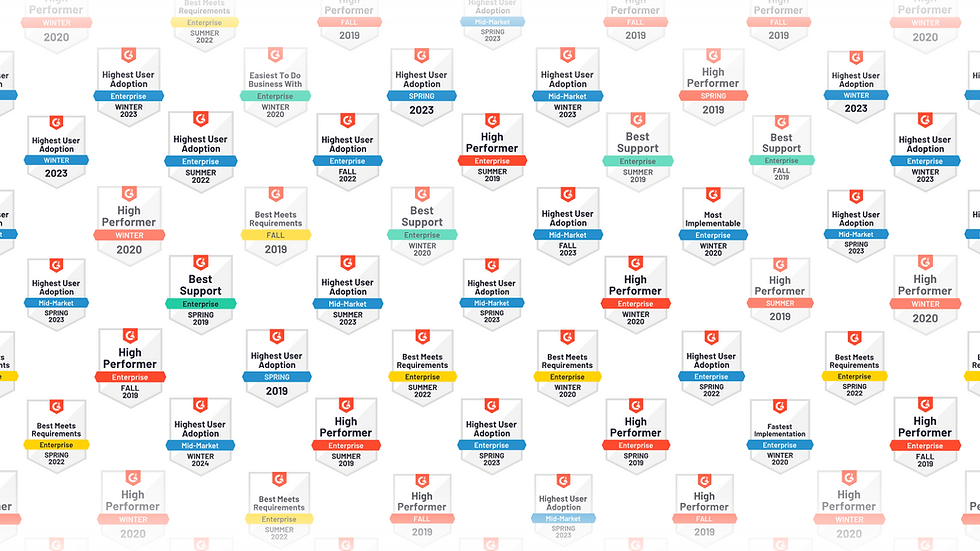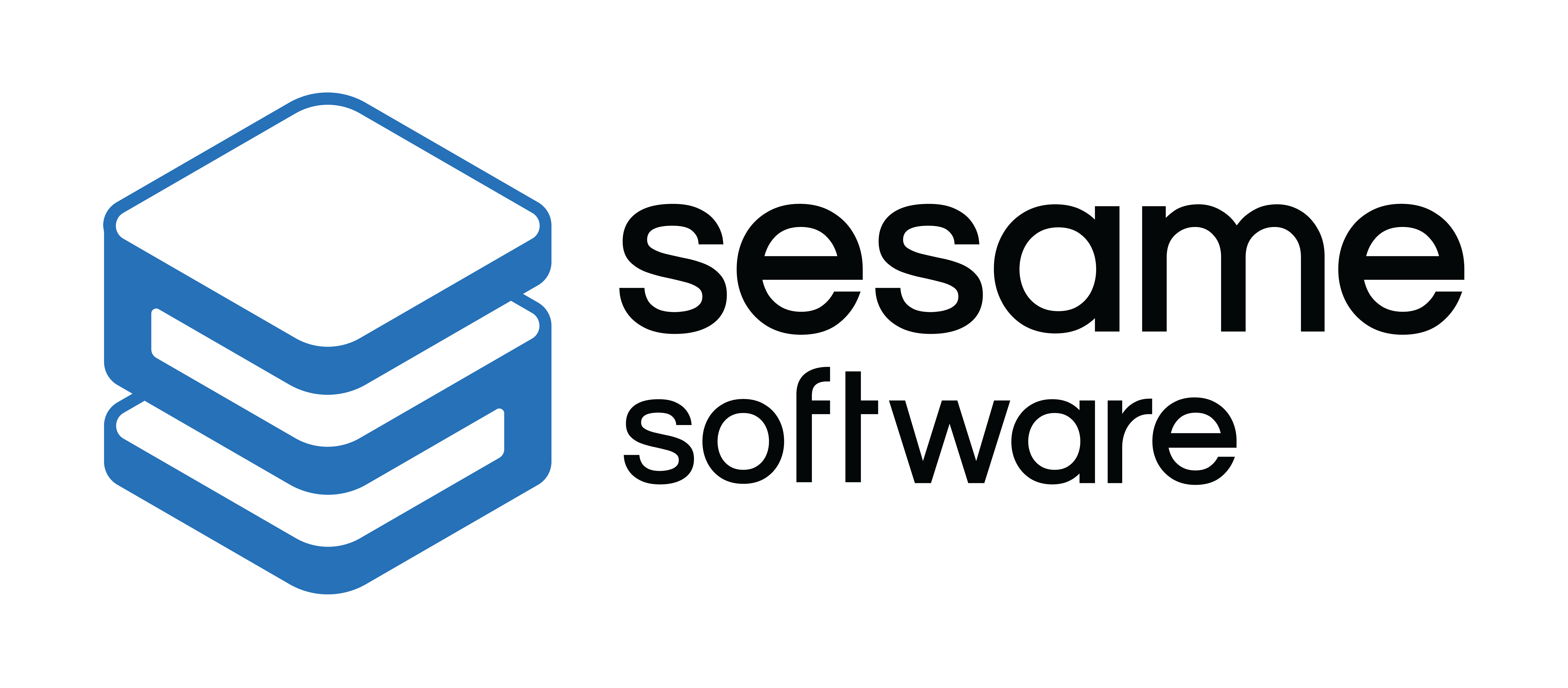
Control Your Data in 3 Steps
Access your data from anywhere, ensure compliance, and unlock its power to grow your business.
Talk to a Data Expert
First, we’ll discuss your data management needs, use case, budget, and users before presenting a customized demo and answering all of your questions.
Tailor, Centralize, Protect
Then, we’ll help you connect, move, or protect your data – ensuring you get maximum ROI – no matter how many datasets you have or connectors you need.
Take Back Control
Now that your data is in the location of your choosing, is protected, and is easily recovered no matter what happens, you can have peace of mind.
Trusted by Hundreds of Insights-Driven Companies
Our Services
How will your team use Sesame Software?
15
Patents
20+
Endpoints
30+
Years in Business
100,000,000+
Records Duplicated Daily


About us
It’s your data. You deserve total control over where it’s located and how it’s protected.
At Sesame Software, we know how critical it is to move large volumes of data quickly without sacrificing security, access, or compliance.
For over 30 years, organizations like Procter & Gamble, Bank of America, and the U.S. government have trusted us to connect, move, store, and protect their data.
With enterprise-level expertise and a scalable, easy-to-use platform, you can take back control, ensure compliance, and unlock the full power of your data.
Why choose us?
Managing siloed data and a massive tech stack is hard, especially when you can’t control where it lives or how it’s protected.
Your insights-driven company can’t operate this way, much less stay protected and compliant, especially if disaster strikes.
Automate data movement, modeling, and replication with Sesame Software, no custom code required, no more wasted hours.
Meet retention policies and location-based compliance requirements with built-in security, auditability, and flexible storage options.
Break down silos and unify your data in near real time so your teams can make faster, smarter decisions with complete visibility.
With reliable replication and centralized access, Sesame ensures your data is always connected, consistent, and ready when you need it.



+98.9%
Customer
satisfaction

“10 years ago, I was tasked with finding a way to easily and securely backup and integrate my Salesforce Orgs. We needed the data for integrations, analytics, and compliance – we chose Sesame Software. The setup does not require professional services, and it is very straightforward. More importantly, it just works. Very reliable and very fast! About two years ago, I had the challenge of integrating Smartsheets with our back-end systems. The Sesame team came up with a simple solution that worked with their ETL product. Other products can do what Sesame Software does, but it comes with a cost and complexity.”

“Sesame Software’s resources proved to be very responsive and much more economical than any large consulting organization I can think of. Sesame’s professional services team converted all our GoldMine legacy data with great accuracy and skill, enabling us to make a painless transition. They have an excellent knowledge of both business processes, as well as the technical skills needed to do a complex migration. Our IT team could not have done this in-house. It was totally worth it. Sesame also provided very useful guidance and hands-on training in configuring and implementing a process and data model that works for our business.”

“We had planned a project to build a proper customer database repository in-house, to replace the poorly designed CRM database from our previous vendor. The Sesame Software for Salesforce product eliminated the need, saving us countless hours of work and ongoing maintenance for an inhouse database. Sesame Software’s product has been running smoothly since June 2005. The level of support, and the level of understanding of how Salesforce.com works, has been a tremendous benefit to our own implementation. I strongly recommend this product and the vendor to anyone who needs to integrate internal applications to their Salesforce.com data, without requiring a knowledge of SOAP or the Salesforce.com API.”

“We first became interested in Sesame Software to address some complex issues with our initial data load. We wanted to stage the data into a MySQL database, manipulate it as appropriate, and move it from there into Salesforce. Sesame Software, with its bi-directional replication, made that process work for us with minimum pain. Along the way, we started having all sorts of thoughts about how to leverage the power of Sesame Software. The biggies for us are the ability to do complex reporting off of the MySQL database and the ability to do integrations with greater control. The support from Sesame Software simply couldn’t be better.”

“We needed a cost effective solution to help us gain a single view of our customers as well as free us of some of the reporting limitations inherent in Salesforce. Sesame Software helps us do that by allowing us to replicate Salesforce data hourly into our data warehouse. It has also opened up integration possibilities with many of other legacy systems that do not support web services. What we love about Sesame Software: Easy to install; Easy to use; Bi-directional data transfer; Dynamic schema updates; Ability to synchronize in near real-time if required; Reliable; Great support.”

“Sesame Software is a nice tool for replicating your Salesforce database. With it’s easy-to-us configuration file approach, it’s very easy to setup/schedule jobs to run as needed. I particularly like it in a scenario where you have a development team that doesn’t need to learn the Salesforce API, but can code in Oracle/MySQL like it’s nobody’s business. Just hookup Sesame Software and have them make their updates right into Oracle/MySQL and then sync the updates back. Piece of cake! You can tell the application was written by someone that has a lot of experience with Salesforce because it works around Salesforce’s nuances. Nice!”

“Sesame Software is a great tool for data replication. I set it up day one and have not had to touch it since then. It runs every day and reacts to our data model changes without any manual intervention.”

“We’ve been using Sesame Software for the last 1 1/2 years to mirror Salesforce with our MySQL database which drives our customer facing website Crushnet.com and acts as a data warehouse for our winery operations data. Sesame Software is easy to configure and highly customizable. Product support is fantastic!”

“Highly Integrated with Salesforce.com; Scalable Solution; Cost Effective; Portable; Ease of Deployment and Maintenance; Responsive Product Support. We use Sesame Software in two areas. One area is the replication of cloud data to an in-network database supporting our downstream business processes and reporting needs as well as our BCDR requirements. The second area is the ETL tool allowing us to bi-directionally share and maintain operational data across Salesforce.com and several non-cloud based applications such as EDI, Analytics, and reporting services.”

“We adopted Sesame Software because it’s a very powerful and complete product for integration. We use Sesame Software to mirror Salesforce and sync data to our SQL server every 30 min. It works great for us. Sesame Software helped us to set up the product, so we didn’t have to do much to get it going. We used the SQL database to do reporting because Reporting Services builds more complicated report. Sesame Software has great products and provide more functions than we need. We’ll explore more features when requirements come up. Also the pricing works out very well for us too. We are very happy with Sesame.”

“Sesame Software is indispensable and error free. If you’re used to using SQL, then it’s the natural way to go. Finding data in a database is much easier than running reports in Salesforce, exporting through the dataloader, or using the API. Mass updates are no problem and it’s much easier than excel. We’ve added database triggers and integrated to other databases and internal applications to tie Salesforce right into our infrastructure, and we couldn’t do it in our timeframes without it. Sesame Software makes Salesforce seem like a locally installed application, and I couldn’t live without it!”

“We’ve used Sesame Software to replicate our Salesforce data to Oracle for over a year. We were hitting Salesforce formula limits, needed to move data easily between objects, and wanted the power of SQL for exports and imports. With an Oracle back-end and Oracle Application Express, we solved these issues. Since calculations are mission-critical, our Sesame Software interface runs every 10 minutes, 24/7. Setup was surprisingly easy—I handled it as CTO with minimal developer skills—and maintenance is simple. The Sesame Software team is extremely responsive, usually replying within minutes and resolving any issues within hours. The data movement algorithms are well designed and need little tweaking.”

“If you’re looking for replication/integration solution for SFDC, you need to seriously consider Sesame Software. It’s a snap to setup and configure, and more importantly it has been running consistently without any major obstacles. Maintenance is simple and scalability is robust. The Sesame team is super easy to work with. We spent time evaluating other solutions, but Sesame Software was our choice and it has turned out to be one of our best decisions thus far!”

“Regent Luxury Group, part of Carlson Companies, chose Sesame Software to move data between our data warehouses and Salesforce. Sesame Software has been pivotal for sharing data between our Operational Data Stores and Salesforce, with multiple feeds syncing daily. This gives our Field Sales teams up-to-date information for customers and travel agents. Integrating data from all sources was a challenge, and Sesame Software solved it. Our reliance on Salesforce has grown steadily, and more teams are adopting it for sales and marketing.”

“It’s been a huge benefit for the college and it’s ended up saving us money. In the Return on Investment (ROI) world in which we operate, Sesame Software pays for itself.”

“Sesame Software greatly accelerated my project timeline. There was no upfront work required for project and data mapping; I could load my data into my database in one week, an operation that would have taken me weeks or months just to data map the fields. Sesame Software is publicly available on the Oracle Cloud Marketplace and I can now deploy it with just a few clicks to accelerate my migration projects.”

“This is a cool product. We have some objects with huge data and all that data is now sitting in Oracle making the complex joins easy. This is increasing our team’s productivity and we are able to envision plenty of new avenues for building better integrations. Also, there were couple of reports that timed out in Salesforce but now that we have them configured in Oracle the performance of the report is also better and we do not have to worry about the governor limits any more.”

“We use Sesame Software for bidirectional integration with Oracle – the product works seamlessly. We can now access and update our SF data in Oracle tables, without any concern for underlying compatibilities. Great value to our business, huge savings in development costs.”

“Sesame Software has improved our Salesforce.com productivity, enabling a seamless integration between our existing applications and Salesforce data. Sesame Software made it easy to share the ownership of data between Salesforce and in-house software applications.”

“We would like to express our sincere appreciation for Sesame Software’s product. Until now, we have been struggling to replicate Oracle Fusion ERP data into our Data Warehouse server. After we were introduced to this product, with the help of the Sesame team, we were able to install the Sesame Software Warehouse application through Oracle Marketplace. The Sesame Software team was able to help us install and configure this application in less than an hour. This is amazing!”

“Sesame Software is a key factor in our success as a Salesforce customer. As great as cloud computing and services are; there are times when you want data on the ground where you can access it for reporting, BI, data feeds for other systems, and as a mechanism to update data in the cloud. There are so many other uses as well. Sesame Software is a key factor in our success as a Salesforce customer. I do not recommend too many products, but I have no problem recommending this one.”

“This has been a godsend for some web applications we are building — everything becomes simple and fast SQL queries to a local synchronized database that is always there. Much easier and more reliable than having to deal with the necessarily complex SFORCE SOAP interface. Great product!”

“We are an international company in the finance area and we use Sesame Software now in Europe (in future for APAC as well) for one year to integrate our MIS system. In addition we create Adhoc-queries for our users with SQL. Our development department is placed in Germany. We exchange Company / Asset data between salesforce and our MIS system every day in high number (30,000 companies / about 100,000 assets). The system runs very well and in addition we have a very good support from Sesame Software. Every question we ask will be answer very fast despite of the time difference we have.”

“An easy to use, install and maintain ETL solution. Good and friendly support and fast response time. We use the export for backup to a Hyperion db and report in a way that is not possible from Salesforce (yet). Happy customers since 2008!”

“Sesame Software was the only application we found that was capable of migrating data from one Salesforce instance to another while maintaining the complex relationships between the various objects, including polymorphic id fields such as whoId, whatId, etc. The challenge here is that you don’t know the values of the inserted ids until the time of insertion. So, for instance, you need to wait until you migrate the account records until you can prepare the value of the Contact. AccountId field. This is even more complicated when you consider that you may have account lookup fields in multiple places as custom fields, even on custom objects. Multiply this problem by the total number of cross-object relationships (lookup or master-detail), including all custom objects, and you have a nightmare of a problem. Sesame Software automatically detects these relationships and generates the database triggers necessary to map the old IDs to the new IDs that are derived upon insertion.”

“I knew that I could dramatically improve productivity and reduce costs by moving Junior Statesmen Foundation to Salesforce. There was only one thing missing: a flexible, affordable customer portal. Sesame Software solved the problem. They now have a Customer Portal product that builds on their Sesame Software product. We use it to expose Contact, Opportunity, and Product options to our members, and now we are using it with custom objects as well. We have been using the portal for three months now, and both the product and support are great.”

“We had spent three months looking for an integration tool to use between our internal systems and SFDC. After reviewing all of the partner tools we felt Sesame Software was the best one available. Once we installed the service we were up and running with bi-directional data in three weeks. The setup is straightforward and easy and does not require consulting services to figure it out. The support we get is fantastic and the turnaround time is very, very good.”

“Replication was surprisingly fast given the volumes of data. Recommended! We’ve just installed this application to replicate our instance to a local SQL database. The setup was easy and the support so far has been really fantastic. Replication was surprisingly fast given the volumes of data. We are suddenly in a position to offer greater analysis and reporting than has been possible so far with native reporting tools. We have yet to fully explore all the possibilities but it has already made a huge difference to my peace of mind, and is finally bringing our reporting capability in line with our reporting ambitions.”

“Having Sesame Software is a must if you have Salesforce. It has helped us to have a live copy of all our Salesforce data onsite so we could have a backup in case someone deleted data accidentally. We have had to restore an entire account with all associated data, and it worked flawlessly. Additionally, having the data onsite in our DB servers allows us to do consolidated reporting with other classic databases. Having Sesame Software is a must if you have Salesforce. The DB Server can be on almost any type of platform, and it works extremely well very little focus time to keep it running.”

“As DBA I can manage this environment using only myself to do so. Sesame Software set up was less than an hour, what was intended to be a test soon became production and has been able to keep up with the business. The translation between Salesforce and Oracle is facilitated by having to know nothing more than that object name to start the data exchange. It even provides schema reports that I provide to the business as well. Whether it be objects far more complex than necessary or new applications like ServiceMax, I am able to get the business analysts the data they need, when and where they want it. Also when massive loads are needed, Sesame Software is there to load the data. The only effort spent is to say what I need and then going to get it. As DBA I can manage this environment using only myself to do so. The support is perfect.”

“Our experience with Sesame Software has been excellent. Before Sesame, we struggled to find an integration solution between NetSuite and Oracle that required little post-live maintenance. Sesame solved this by closely mirroring our ERP data structure and making setup simple for all table entities and data. Now, our external database feels like an extension of our ERP, not a separate warehouse needing extra configuration. Sesame’s team has been exceptional—very responsive and hands-on throughout the integration.”

“We initially needed a backup solution for our Salesforce.com development but knew we would need to expand this to enable data replication to our data warehouse and other internal systems. It was straight forward to setup and configure, and has been found to be extremely reliable. I would recommend this product based on our experience so far.”

“When we first implemented Salesforce, we were loading data via a manual process by providing flat files from the source system and using human intervention. Not only was this process unstable, a typical load would take over 24 hours to complete. Implementing Sesame Software not only reduced our data loads into Salesforce to between 7-8 hours, and it is extremely stable. We have been using the tool for over 6 months, and it runs smoothly on a daily basis. Pros: Reliable, Simple, Implementation Ease of Use, Reasonable Cost, Excellent Support Cons: None If you are looking for a tool to integrate with Salesforce, Sesame Software is an excellent option.”

“Sesame Software is a great tool. It was the perfect solution for our needs, making all the data available for our custom applications. It greatly simplified daily automated updates. It also provided a simple way to keep our analytics data warehouse up-to-date. Our DB Admins love the way it makes the entire database accessible using conventional tools. Sesame Software Support is EXCELLENT. They always responded right away with clear solutions and explanations to all of our configuration and implementation questions. Sesame Software is a great way to fill the gaps in Cloud Computing.”

“We have been very happy with Sesame Software, specially their real-time sync option. We got SS to solve a specific problem which was meant to overcome some of the governor limits in Salesforce. Since, the usage of this software has expanded astronomically and we have been using this as an operational element to extract data for reports, pump data into Salesforce to name a few. We have been very happy with Sesame Software, specially their real-time sync option.”

“Sesame Software is an excellent tool for data replication and is very efficient. We carried out trial versions of several other similar tools before implementing Sesame Software. The data sync process is very fast and smooth. It is very less error-prone compared to most other tools that we tried. We also got excellent support from Sesame Software to get the initial setup done. Support was always just a call away! Our team would highly recommend using Sesame as an efficient data replication tool. Cheers to Sesame! Keep up the good work!”

“NetSuite is a very powerful tool for us and Sesame Software helps us get the most out of it.”

“Sesame Software has been a fantastic tool to work with. The NetSuite integration was set up in under an hour.”



